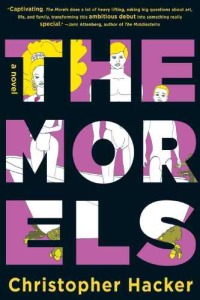The Morels by Christopher Hacker
 Monday, May 6, 2013 at 3:00PM
Monday, May 6, 2013 at 3:00PM 
Published by Soho Press on April 30, 2013
The Morels might be summarized as a book by Christopher Hacker about a writer named Arthur Morel who writes a book titled The Morels. Yet that summary, while accurate, would not do justice to Hacker's stimulating novel. The Morels is actually two absorbing novels merged into a successful whole. Alternating between philosophy and storytelling, the first half of The Morels is an examination of art: the purpose of art; the meaning of applause; whether the creation of literature should be driven by readers' demands; the difference between literature (solitary in its performance and reception) and most other art (experienced communally and offering immediate feedback to the artist); the extent to which the act of writing literature can be blended with artistic performance. The second half is an examination of an artist. It tells the riveting story of a writer who becomes lost in the blurry gap between the real and fictional worlds he inhabits. What is the difference, Hacker asks, between reality and its artistic representation?
In his desire to create an emotional impact that his audience will experience honestly, Arthur Morel, an accomplished but socially inept student of the violin, does something shocking during a performance. His friend Chris (the novel's narrator), playing the cello in the orchestra, does not see Arthur again for fourteen years. While Arthur seems to have fallen into an ordinary domestic life, complete with wife (Penelope) and child (Will) in Queens, he's also authored a best-selling book -- a fortunate development since, according to Penelope, he's otherwise "barely employable." Chris, a struggling filmmaker who feels adrift and craves guidance, renews his friendship with Arthur with the hope that Arthur will become his mentor. Yet the roles are reversed when Chris tries to become Arthur's teacher, an advocate for responsible limits on artistic license, limits that Arthur dismisses as evidence of limited taste.
The first half of The Morels poses penetrating questions and challenges the reader to form his or her own answers: Is art worthwhile if it fails to provoke, if it appeals only to people who have weak stomachs? Should a writer be shunned for depicting, without judgment, an act that society would universally condemn? Are decency and moraltiy essential components of enriching literature? Is it the obligation of literature (as John Gardner argued) to promote moral conduct? Or is (as Arthur argues) "the death of transgression" also "the death of art"?
Most of the story's drama surrounds Arthur's second novel, The Morels, a book that is about "the dilemmas of everyday life." In other words, like much contemporary fiction, "there's little story to speak of." It is a self-referential novel of "exquisitely rendered scenes, well-observed prose." It also has a shocking ending. Its publication causes repercussions that drive the story's second half.
Does this description of Arthur's novel also apply to Hacker's? Yes and no. Arthur is portrayed as a literary genius. Hacker is not quite of that caliber, although his skills are admirable; his prose is wonderfully descriptive and he wields it to tell a compassionate, intelligent story. Arthur's book "uttered what can't be said" while Hacker found a way to write about provocative art without actually producing it. Arthur reveres and emulates writers like Gass and Barth and Burrows, precisely the writers Gardner eviscerates. They are (Arthur tells us) writers who don't try to make us feel good, who leave us feeling confused about who we are rather than confirming our understanding of ourselves. Hacker straddles the line: he allows the reader to feel good by making it possible for the reader to understand why the artistic representation of depravity might have value -- and to understand why an artist might be driven to produce it. Hacker's novel might be less "courageous" than Arthur's, but that doesn't diminish its worth. And, unlike Arthur's version of The Morels, Hacker's has a plot (in addition to, but intertwined with, unraveling "the puzzle of Arthur Morel"), although it doesn't blossom until the novel's second half. This isn't a courtroom drama, but it does generate dramatic tension as Arthur and his family become entangled in the criminal justice system as it engages in the difficult and error-prone task of separating fact from fiction. And if the ending of Hacker's novel isn't shocking, it is sufficiently surprising to cast the entire story in a new light.
The Morels pulls no punches. It isn't the right book for a reader who craves sunny characters and upbeat endings. Arthur, tortured by the past, learns something meaningful about living in the present, but this isn't a story about someone who learns a valuable lesson and lives happily ever after. No character emerges unscathed (although, as one character learned in Vietnam, "given time, even scorched earth recovers"). While Arthur, Chris, and Will each learn something about how to live a life, the true lessons of The Morels are more subtle. Mining the depths of this memorable novel to unearth them is an enriching experience.
HIGHLY RECOMMENDED